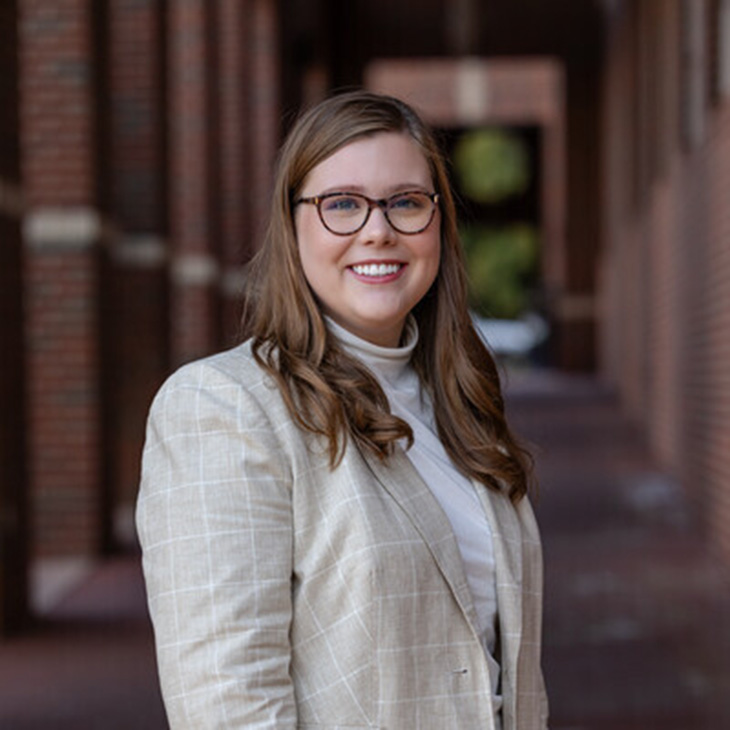
OSU student explores political and economic unrest through research
Friday, April 25, 2025
Media Contact: Jeff Hopper | Communications and Media Relations Manager | 405-744-5827 | jeff.hopper@okstate.edu
Oklahoma State University senior Kylie Hammack’s work could have global implications for foreign aid effectiveness.
She is using her undergraduate research experience to explore the complex relationship between economics and political unrest in sub-Saharan Africa.
A double major in political science and economics, Hammack’s research bridges both fields, focusing on how local corruption and economic development can influence a foreign aid project’s success. Her latest project zeroes in on Uganda, Tanzania, Nigeria and Kenya, using local-level data to understand how corruption affects foreign aid outcomes in these nations.
“I think it’s important to understand where foreign aid goes and when it is successful — and when it’s not,” Hammack said. “Especially now, as we think about the future of global development, knowing the conditions that make aid work really matters.”
Hammack began her research journey through OSU’s Freshman Research Scholars, which pairs first-year students with faculty members. She’s continued to work under the guidance of Dr. Holley Hansen, a teaching associate professor in OSU’s Department of Political Science.
Her early work examined how economic conditions could predict political unrest, specifically riots and protests, rather than civil wars or armed conflict. That project revealed a surprising bell curve: the most political unrest occurs not at the lowest or highest levels of economic development, but in the middle, where a growing middle class may have more time, resources and political expectations.
“Research teaches you to be persistent; things don’t always work the first time. But
it’s given me skills I never thought I’d have coming into undergrad.”
Now, her research examines corruption and how it may hinder or help the effectiveness of foreign aid. Using data from Afrobarometer — a large-scale African survey project — and satellite-based nighttime luminosity as a proxy for economic growth, Hammack is building a detailed, localized model to explore these questions.
“One of the most interesting parts of this research is working with survey data at the local level,” she said. “It helps show how people experience institutions on the ground, especially in places where the local government might be the only point of contact.”
To analyze the data, Hammack uses geographic information system software to geocode survey responses and map them to standardized spatial grids. This allows her to compare local corruption levels with aid and development outcomes. Although the technical side of her research was challenging — especially learning to use ArcGIS — she said it strengthened her resilience and adaptability.
“Research teaches you to be persistent; things don’t always work the first time,” Hammack said. “But it’s given me skills I never thought I’d have coming into undergrad.”
Hammack’s work has taken her beyond the lab as well. She presented at the American Political Science Association National Conference in fall 2023 and received travel support from the College of Arts and Sciences. She is also a Wentz Research Scholar and a past participant in the Taos Retreat, a writing-focused trip for students applying for national and international scholarships.
Next year, Hammack will continue her academic journey across the Atlantic. She has been accepted to the University of Cambridge in the United Kingdom, where she will pursue a master’s degree in politics and international studies. There, she plans to explore the intersection of artificial intelligence and conflict prediction — an emerging area she hopes to contribute to using the data analysis skills developed at OSU.
Hammack has advice for future student researchers.
“Just go for it. You learn so much by being curious and asking questions. Social science research might not look like a lab, but it’s just as important and rewarding,” she said.
Through OSU programs like the Freshman Research Scholars and Wentz Research Projects — and with support from the Henry Bellmon Office of Scholar Development and Undergraduate Research — students like Hammack show how undergraduate research can lead to meaningful impact and global insight.
Story By: Matthew Hunter | matthew.hunter10@okstate.edu
